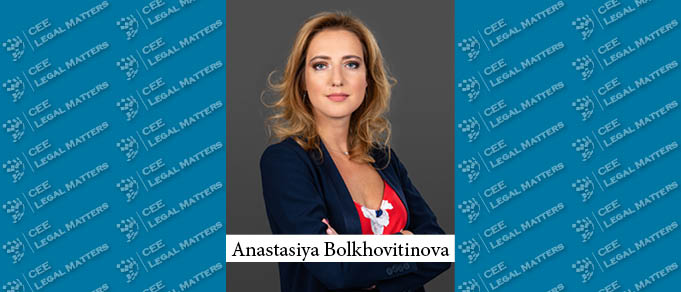On June 14, 2021, CEE Legal Matters reported that the former DLA Piper office in Ukraine had merged with Kinstellar. We spoke with Co-Managing Partners Olena Kuchynska, Margarita Karpenko, and Senior Counsel Daniel Bilak – the Management Committee of the combined team – to learn more about the merger and their plans going forward.
Mandatory E-invoicing: Digitalization Is the New Mainstream in Supply Chains
In the age of digital philosophy, when the electronic management of documents become more and more prominent in both private and public sectors, digitalization of invoices is rather a logical development than an innovative approach in the functioning of the supply chain. Harmonization of e-invoicing regulation in B2G sector has been in effect for seven years in the EU, while Serbia established an e-invoice system in 2019, prescribing mandatory registration of invoices issued in commercial transactions with the public sector on the central registry of invoices (CRF). The most recent novelty in the field happened with adopting the Electronic Invoicing Act and its by-laws when a comprehensive set of rules regulating e-invoicing came into effect.
Dissonant Optimism: Mergers and Acquisitions in the Bulgarian Technology Industry
Looking at the past 18 months, as economies across CEE contracted, the technology, media, and telecom sector has been surging. A balancing factor for economies, it helped avoid a deeper recession. For CEE law firms, TMT’s solid performance brought in a steady amount of work, helping polish what might otherwise have been a lackluster year.
Hard At Work: Ukraine’s Busy Legal Market
The Ukrainian legal services market has been buzzing with work in the first half of 2021. CEE Legal Matters hosted a round table conversation in which Partners at Asters, Avellum, Integrites, Kinstellar, and Sayenko Kharenko discussed the driving forces behind the workload and their outlook for the months to come.
Remote Work in Serbia – Safety Measures, Rights and Obligations
Technological progress has a magnificent impact on everyday business life, and one of the things made possible by it is creating the opportunity for employees to perform work outside their business premises. But although technological progress gave employers the means to operate their business through remote work, the rigidity in incorporating this work model in practice was shaken only after the COVID-19 pandemic struck, making the expansion of remote work models a result of practical necessity. The sudden spread of remote work in companies also brought concerns of legal nature, and questions like what are the best ways to regulate contracts, safety measures etc.
New Standard Contractual Clauses for International Data Transfers and Data Processing Agreements
On 4 June 2021, the European Commission adopted two implementing decisions (Decision no. 2021/914 and Decision no. 2021/915) which contain Standard Contractual Clauses for processing and transferring of personal data and are set in line with the General Data Protection Regulation (2016/679) (“GDPR”) with the hope of bringing about a higher level of personal data protection.
The Buzz in Ukraine: An Interview with Anastasiya Bolkhovitinova of Kinstellar
Despite the recent escalation of the conflict in Eastern Ukraine and its negative impact on business in the country, Anastasiya Bolkhovitinova, Counsel at Kinstellar, says that telecommunications and IT have been on the rise, and significant legal changes were introduced on tech incentives, foreign direct investment, capital markets, and agricultural land.
New Deadlines Provided by Amendments to the Law on Planning and Construction
On 24 May 2021, the National Assembly of the Republic of Serbia adopted the amendments to the Law on Planning and Construction (“Official Gazette of the RS”, No. 52/2021), which entered into force on 25 May 2021.
Competition And Digital Markets: New Stream in Tackling Abuse of Dominant Position
The standard approach in cases involving abuse of dominant position implies that the competition authority determines the market influence of the company due to which it can operate in the relevant market to a significant extent independently of other market participants and, provided that the company has a dominant position, whether its actions result in abuse of such position. The standard approach came naturally in markets that are geographically and economically limited. The core of the principle is that the public authority reacts ex-post (after the event) to abuses, by imposing the obligation to terminate anticompetitive practices or imposing penalties for prohibited behaviour.
What Happens to Collected Health Data on COVID-19 Patients After the Pandemic is Over?
The global crisis, which arose as a consequence of the COVID-19 pandemic, brought light, among other things, to the weaknesses of the Serbian public health care system. The daily mass collection of a person’s data on health – which, according to the Serbian Data Protection Act, is considered particularly sensitive data – became a regular occurrence during the pandemic.
An Overview of Serbia’s Banking Sector
Since the emergence of the COVID-19 pandemic, the Government of the Republic of Serbia has, on several occasions, introduced measures aimed helping businesses maintain liquidity and working capital. These measures have included, among other things, direct subsidies worth a total of EUR 200 million in the form of loans available to entrepreneurs, cooperatives, micro-, small-, and medium-size businesses, state guarantee schemes to encourage banks to extend loans to businesses, and a moratorium on the repayment of loans which lasted until September 30, 2020.
What to Keep in Mind When “Legalizing” an Existing Work-From-Home Arrangement
Over the past year, many employers have had their employees switch to working from home, since this was considered to be the best preventive measure against the spread of COVID-19 among the workforce.
Ukraine: Success or Disappointment – What Will the Opening of Ukraine’s Agricultural Land Market Bring
For nearly 20 years, private land owners, agricultural producers, and investors have been waiting for Ukraine’s government to cancel the moratorium on the sale of agricultural land in the country.
Inside Out: E.ON Acquisition of Stake in VSE Holding
On September 22, 2020, CEE Legal Matters reported that Kinstellar’s Bratislava office had advised E.ON on its acquisition of a 49% stake in electric utility Vychodoslovenska Energetika Holding from the German electric utilities provider RWE. We reached out to Kinstellar Partner Viliam Mysicka for more information about the deal.
Guest Editorial: What is Changing in Lawyering in the Region
January is a perfect time to look back and plan for the future. To reconsider our accomplishments and learn our lessons. To think what could have been done better, more efficiently, or just in a different way. To set our expectations, make commitments, and dream big.
New Captain at the Helm: Kinstellar’s New Managing Partner in Kyiv
On July 28, 2020, CEE Legal Matters reported that Olena Kuchynska had been appointed the new Managing Partner of the Kinstellar’s Kyiv office. After a few months of settling in, we spoke with Olena to learn more about the team she’s been appointed to lead and her plans for the future.
After the Gold Rush: What Causes and Comes After an International Law Firm’s Departure from a CEE Market
In the first decade after the fall of the Berlin Wall in 1989, an enormous number of international investors descended upon the countries of Central and Eastern Europe – initially, and particularly, Romania and the so-called “Visegrad Group” of Poland, the Czech Republic, Slovakia, and Hungary – to take advantage of the privatizations occurring across the region and, in the early years, manifold new and giant deals related to the region’s rapid modernization and integration. Inevitably, many of the larger London-based international law firms opened up offices in the region to provide their clients with on-the-ground assistance.
Inside Out: Privatization of Komercijalna Banka
On March 5, 2020, CEE Legal Matters reported that Kinstellar had advised Nova Ljubljanska Banka d.d. on the conclusion of a share purchase agreement with the Republic of Serbia for the acquisition of an 83.23% ordinary shareholding in Komercijalna Banka a.d. Beograd. Serbia’s AP Legal and Prica & Partners advised the Government of the Republic of Serbia on the privatization.


















